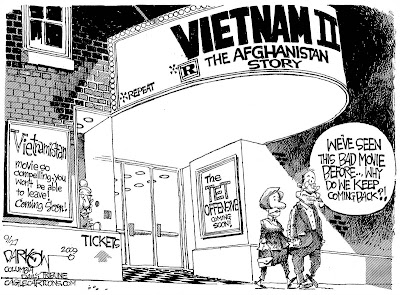Matthew Hoh and Vietnamistan : Déjà vu all Over Again

A bright and shining lie:
Hoh's Afghanistan and John Paul Vann's Vietnam
By Richard Lee / The Rag Blog / November 8, 2009
I just got a copy of diplomat Matthew Hoh’s resignation letter from a friend in Canada. I don’t get a lot of news from up in the States and what few blips I do get are in Spanish. There was some reporting of the letter but with only a couple of quotes, mostly from the first and second paragraph. Mostly it just passed me by. I heard it was more thoroughly covered by what you call the “news” up in the states.
I read it through a couple of times; it had a familiar ring to it. Where had I heard this before? Oh yeah, then I remembered, it was in Neil Sheehan’s book, A Bright and Shining Lie, John Paul Vann and America in Vietnam.
Their stories parallel and at the same time mirror each other. Like Hoh, Vann first went to Vietnam as a soldier, a Major who went there as an “advisor” for an ARVN Battalion in the upper Mekong delta. He served under General Paul Harkin the commander of MACV in 1962-63. Both later returned to the battle zone as civilian workers for the USG.
It became clear to Vann in that year that President Kennedy and the boys at the Pentagon were clearly on a wrong course. The strategy of attrition and the belief that the Diem government wanted to win against the communist could only lead to disaster.
Hoh cites the Afghani government as an alien body, “unknown and unwanted by its people.” Vann saw the same feelings in the people toward the government of Diem, who was also unknown and unwanted in Vietnam. Both Karzi and Diem wanted the war, not to win it and certainly not to lose it, but to have it and profit in power and wealth for themselves and their friends. It certainly was a stroke of good luck for each that they had the Americans to fight it for them.
In Afghanistan, Hoh writes that “from at least the end of King Zahir Shah’s reign (it) has violently and savagely pitted the urban, secular, educated and modern of Afghanistan against the rural, religious, illiterate and traditional.” In that other war the urban, catholic, educated and modern, from the end of the reign Bao Dai, was pitted against the rural, illiterate and traditional. A class war within the civil war.
John Vann’s war was sustained by the struggle against a corrupt and brutal army backed by foreign invaders who were totally ignorant of the history, culture and traditions of the people of Vietnam. Hoh finds the same conditions in Afghanistan. He writes, “The United States presence in Afghanistan greatly contributes to the legitimacy and strategic message of the Pashtun insurgency. In a like manner our backing of the Afghan government in its current form continues to distance the government from the people.”
Both Hoh and Vann cite the same conditions:
Hoh’s resignation letter goes on to find his own analogies to that other war and like Vann he was always aware of the courage and skill of our own troops.
John Vann died in Vietnam in a helicopter crash, still trying to get the generals and politicians to heed their folly; Hoh resigned in a public way hoping the generals and politicians would heed the words of his letter and discover their current folly.
From me to Mr. Hoh: I’ve been there, don’t hold your breath.
The Rag Blog







